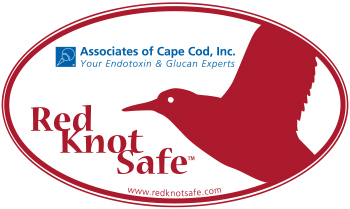
"Red Knot Safe™" signifies Lysate that is manufactured by Associates of Cape Cod Inc., utilizing raw material that is specifically sourced avoiding female horseshoe crabs from the Delaware Bay watershed. This awareness will enable consumers to better understand the environmental impact of their BET supplier operations.
Red Knots migrate between the Arctic to the southern tip of South America. They feed on the eggs of the Horseshoe Crab (HSC) to sustain themselves at specific locations during their journey. In their northward trek, the Delaware Bay watershed is believed to be a critical feeding point while en route to their eventual breeding grounds in the Arctic. In order to sustain the Red Knots, a sufficient supply of HSC eggs is essential so all efforts to support a strong HSC population in the Delaware Bay watershed should be encouraged.
HSCs have been utilized both as a bait source up and down the Atlantic coast as well as raw material supply for biomedical industry Bacterial Endotoxin Testing (BET). Crabs for bait are sacrificed for the eel, conch and whelk fisheries. Crabs for biomedical use are collected live and brought to a laboratory where a portion of their blood is utilized as a raw material for a test for product purity used by medical device, pharmaceutical, biopharmaceutical and related companies which is required by the US FDA. Biomedical crabs are quickly returned to the embayment from which they were collected under established procedures (industry best practices overseen and enforced by local regulators) designed to minimize the stress on the crab. The biomedical industry has a vested interest in protecting all HSC fisheries up and down the Atlantic coast.
Various BET manufacturers obtain Limulus Amebocyte Lysate (Horseshoe Crab blood) from different regional HSC fisheries along the Atlantic coast. For 45 years ACC has drawn its Limulus Amebocyte Lysate supply largely from the New England fishery, primarily the Massachusetts' HSC fishery which in 2017 was categorized by the Division of Marine Fisheries as stable and increasing in numbers.
ACC has proactively chosen to avoid collecting lysate from egg producing crabs from the Delaware Bay watershed.
BET customers have a clear choice..."Red Knot Safe" reagents are extremely competitive products available to customers who may be concerned about protecting the threatened Red Knot and are intended to meet the needs of customers worldwide.